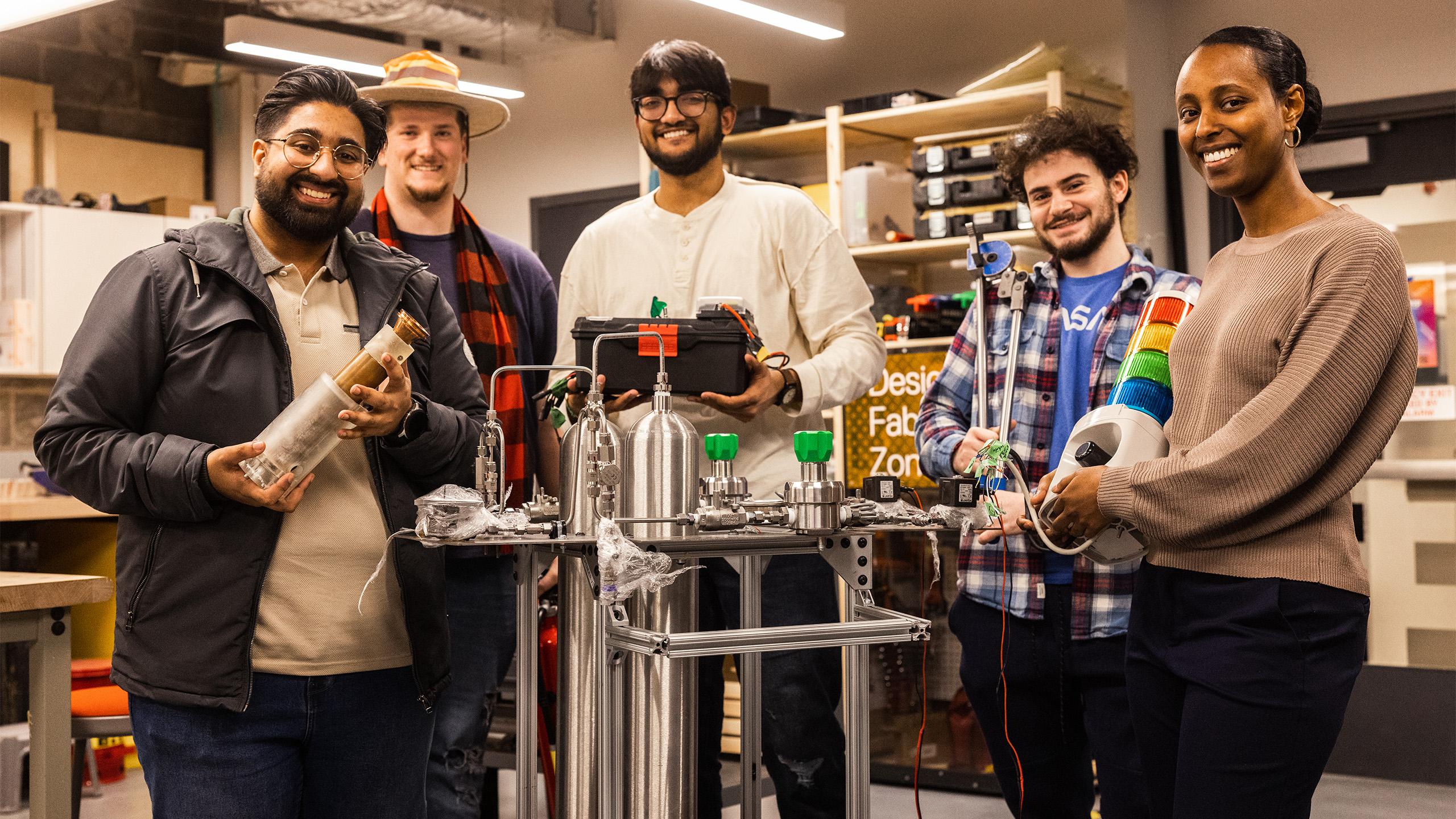By Lillie Coussee
A Toronto Metropolitan University (TMU) student group is hoping to become the first post-secondary team in Canada to build a liquid bi-propellant rocket engine.
Metropolitan Aerospace and Combustion Hub (MACH) is a student group based out of the Design Fabrication Zone (DFZ), which helps TMU students and community members bring their design, invention and manufacturing ideas to life, according to its website.
Borealis, as MACH calls its engine, is the passion project of several TMU engineering students, whose overarching goal is to one day build a fully customized liquid engine propelled rocket.
MACH was formed in 2017 by two members of Met Rocketry (formerly Ryerson Rocketry Club). The two members and TMU aerospace engineering students Balin Moher and Zak Harrison broke off from the original group to begin making liquid engines.
It is currently led by Umar Shabbir, a fourth-year aerospace engineering student.
“Everyone on this team right now is going to be the future of [the industry]”
The engine in question, which is commonly used at NASA in its rockets, uses a fuel and an oxidizer—which is a substance that uses oxygen to help fuel burn—which combine and combust, creating “thrust” which allows the rocket to take off, according to NASA’s website.
This is different than a solid motor, which uses a solid mixture containing fuel and oxidizer instead, according to the European Space Agency.
Though both types of engines have their advantages, liquid ones are particularly useful because they allow more control over the flow of propellants, which means that thrust can be more precisely controlled.
And now, recent legislation in Canada shows a promising future for new grads interested in building these types of engines, says TMU aerospace engineering professor John Enright. On Jan. 20, the federal government announced that commercial space launches will soon be legalized.
“[Launch companies] wouldn’t need to make a special case that [they] need to launch, there’ll be established ground rules for making rocket launches,” he said.
This legislation will focus on space launches, explained Enright, but it will still benefit groups that are interested in building their own rockets. The bulk of new jobs this announcement brings would probably be in satellite building, he said, as “Canada has long had a history of making [them] and the components that go on [them].”
Enright said right now, rocket parts are typically imported from other countries, since Canada lacks the capability to produce them itself. New commercial launch rules will strengthen the supply chain that Canada can provide in terms of space technology services.
“It’s a really exciting time to be an aerospace engineering student because the possibilities are endless in terms of Canada’s contribution to space right now,” said Ben Kubica, a first-year aerospace engineering student at TMU and a member of MACH.
Before the announcement was made, Kubica noted that Canada didn’t seem to have the same level of big career opportunities for him that the United States provided, he said.
“When you think of the US rocket companies, you’ve got SpaceX, you’ve even got private companies like Rocket Lab,” he said. “Canada doesn’t really have much like that.”
Kubica, who joined MACH in Sept. 2022, is part of the combustion dynamics subteam, which is responsible for the manufacturing and testing of the combustion chamber, nozzle and cooling system and is led by fourth-year aerospace engineering student Yiwei Luo.
“The possibilities are endless in terms of Canada’s contribution to space right now”
Luo said it’s really motivating to see the discourse around commercial space launches growing in Canada. He said Canada’s launch industry is just beginning and he is hopeful it will start to develop in the next coming years.
“Having a domestic launch service is definitely something that will be amazing for the Canadian aerospace industry,” he said.
Shabbir said the change in legislation provides an optimistic future for MACH. “As much as it’s meant for commercial space launches, it will obviously trickle down into the amateur side of things as well, which will definitely help us out once we get to that point,” he said.
MACH is working vigorously to make sure Borealis is up and running by August 2023, said Shabbir.
He noted that the team hopes to be the first liquid rocket team to display and test the engine at Launch Canada, the country’s only national rocketry competition.
“Bigger and better and higher projects in the future”
“We’re purely focusing on getting our systems up and running, kind of learning as much as we can and then putting all that knowledge back into building our own rocket,” said Shabbir.
The group is broken into five subteams and each team has a student lead from various disciplines at TMU, including two students who are not in an engineering program. The team consists of students from aerospace engineering, as well as industrial engineering, electrical engineering and even computer science.
The combustion dynamics team works on manufacturing the engine, developing testing procedures and integrating it with other subsystems.
The propellant management team develops all the hardware used to directly support the engine.
The transfer and control team designs all the extensive electrical hardware and software systems needed for the engine.
The safety team is involved in creating documentation, procedure, risk assessments and training for upcoming tests, as well as ensuring that they have the necessary protective equipment.
The business development team is responsible for fundraising, getting sponsorships and maintaining their online presence, as well as developing industry connections to support other sub teams.
“Everyone on this team right now is going to be the future of the Canadian launch industry,” said Luo. “All of us working on this right now, fingers crossed, will be working on bigger and better and higher projects in the future.”










Leave a Reply